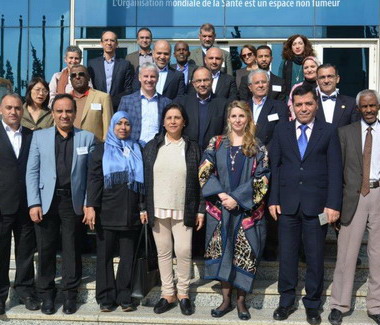
24 December 2019 ‒ WHO, in collaboration with the United Nations Educational, Scientific and Cultural Organization (UNESCO), held the second Eastern Mediterranean/Arab States Regional Summit of National Ethics and Bioethics Committees in Cairo, Egypt, on 15‒16 December 2019. The meeting was inaugurated by Dr Ahmed Al-Mandhari, WHO Regional Director for the Eastern Mediterranean and Dr Ghaith Fariz, Director of the UNESCO Regional Bureau for Sciences in the Arab States. Participants attended from Djibouti, Egypt, Iran (Islamic Republic of), Iraq, Jordan, Kuwait, Lebanon, Libya, Oman, Palestine, Pakistan (via Skype), Saudi Arabia, Syrian Arab Republic, Tunisia and Yemen.
The main goal of the summit was to foster the development of national ethics/bioethics committees in the Region and establish effective mechanisms for regional cooperation to address emerging issues related to bioethics. Specifically, the objectives of the summit were to: follow up on outcomes of the First Regional Bioethics Summit, held in Muscat, Oman in April 2017; discuss outcomes of the last Global Bioethics Summit held in 2018 and plan for the next Global Summit in 2020; outline and discuss methods of regional collaboration, with a special focus on fostering national ethics/bioethics committees; develop strategies to strengthen linkages between bioethics committees and policy-makers (ministries of health, education, science and technology); and share experiences and deliberate on current ethical issues such as migration ethics and the ethics of artificial intelligence.
The discussion covered many subjects related to bioethics in the Region, including: the first Regional Bioethics Summit held in Oman in 2017; the Global Bioethics summits from Dakar, Senegal (2018) to Lisbon, Portugal (2020); and case studies from Bahrain (genetic testing), Lebanon (RCT registration), Islamic Republic of Iran (higher studies on ethics, research ethics governance), Tunisia (developing national ethics committees) and Oman (patient rights and safety). On the second day, the meeting included three presentations on ethics in humanitarian settings by UNESCO, UNHCR and a WHO Collborating Centre in Pakistan. This was followed by discussions on expanded access policy, the LAS/UNESCO Arab Charter on ethics in science and technology, national and regional collaboration between national ethics/bioethics committees, and the upcoming meetings in 2020, especially the Global Bioethics Summit in March 2020.
The participants emphasized the importance of establishing/enhancing the work and roles of national ethics/bioethics committees in the Region, in close coordination with UNESCO and WHO, strengthening national/regional coordination between national ethics/bioethics committees, raising public awareness, especially among patients, on bioethics-related matters, and fostering bioethics principles within the health sciences’ curricula of academic institutions.
The summit was followed by a workshop on ethics in implementation research, held on 17 December 2019, which was co-facilitated by Dr Andreas Reis, Global Health Ethics, WHO headquarters, Dr Ehsan-Shamsi Gooshki, Secretary General, National Research Ethics Committee, Islamic Republic of Iran and Dr Ahmed Mandil, WHO Regional Office for the Eastern Mediterranean.



